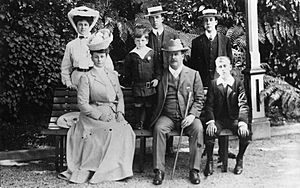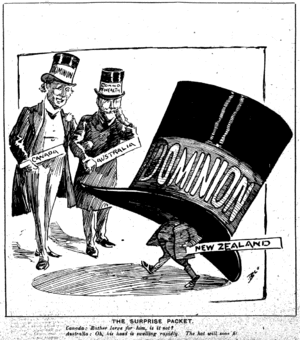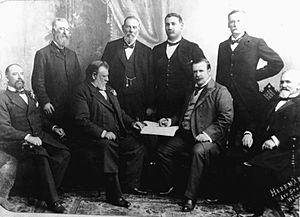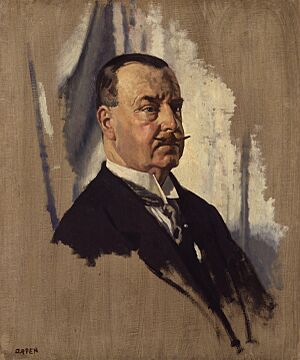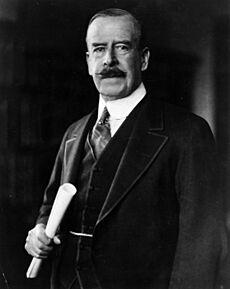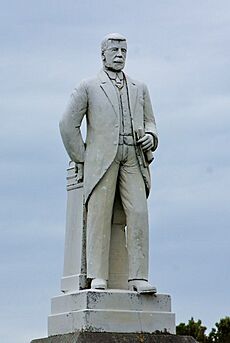Joseph Ward facts for kids
Quick facts for kids
Sir Joseph Ward
|
|
|---|---|
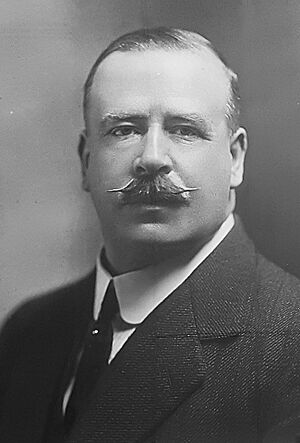
c. 1906
|
|
| 17th Prime Minister of New Zealand | |
| In office 6 August 1906 – 28 March 1912 |
|
| Monarch | Edward VII George V |
| Governor | William Plunket Arthur Foljambe |
| Preceded by | William Hall-Jones |
| Succeeded by | Thomas Mackenzie |
| In office 10 December 1928 – 28 May 1930 |
|
| Monarch | George V |
| Governor-General | Charles Fergusson Charles Bathurst |
| Preceded by | Gordon Coates |
| Succeeded by | George Forbes |
| 17th Minister of Finance | |
| In office 1 May 1893 – 16 June 1896 |
|
| Prime Minister | Richard Seddon |
| Preceded by | John Ballance |
| Succeeded by | Richard Seddon |
| In office 6 August 1906 – 28 March 1912 |
|
| Prime Minister | Himself |
| Preceded by | William Hall-Jones |
| Succeeded by | Arthur Myers |
| In office 12 August 1915 – 21 August 1919 |
|
| Prime Minister | William Massey |
| Preceded by | James Allen |
| Succeeded by | James Allen |
| In office 10 December 1928 – 28 May 1930 |
|
| Prime Minister | Himself |
| Preceded by | William Downie Stewart Jr |
| Succeeded by | George Forbes |
| 6th Leader of the Opposition | |
| In office 11 September 1913 – 27 November 1919 |
|
| Prime Minister | William Massey |
| Preceded by | William Massey |
| Succeeded by | William MacDonald |
| In office 4 December 1928 – 10 December 1928 |
|
| Prime Minister | Gordon Coates |
| Preceded by | Harry Holland |
| Succeeded by | Gordon Coates |
| Personal details | |
| Born | 26 April 1856 Melbourne, Victoria Colony |
| Died | 8 July 1930 (aged 74) Wellington, New Zealand |
| Political party | Liberal (1890–1928) United (1928–1930) |
| Spouse |
Theresa Dorothea de Smidt
(m. 1883; died 1927) |
| Children | 5 |
| Parents | William Ward Hannah Ward Barron |
| Relatives | Vincent Ward (son) Joseph Ward (grandson) Bernard Wood (son-in-law) |
| Profession | Businessman |
| Signature | |
Sir Joseph George Ward (born 26 April 1856 – died 8 July 1930) was an important New Zealand politician. He served as the prime minister of New Zealand twice. His first time was from 1906 to 1912, and his second time was from 1928 to 1930. He was a key leader in the Liberal and United governments in the late 1800s and early 1900s.
Ward was born in Melbourne, Australia, into an Irish Catholic family. In 1863, his family faced money problems and moved to New Zealand. There, he finished his schooling. Ward started a successful business selling grain in Invercargill in 1877. He quickly became well-known in local politics. In 1887, he became a Member of Parliament.
When the Liberal Government came to power in 1891, Ward became Postmaster-General. This meant he was in charge of the postal service. Later, he became Minister of Finance (in charge of the country's money) under Prime Minister Richard Seddon.
Ward became Prime Minister on 6 August 1906, after Seddon passed away. During his first time as leader, Ward wanted the British Empire to be more united. He also helped New Zealand become a Dominion, which meant it had more control over its own affairs. His government faced strong opposition from other political parties. He led the Liberal Party to win two elections, in 1908 and 1911. He stepped down as Prime Minister on 28 March 1912.
During the First World War, Ward led his party in a special government with another party. He worked with Prime Minister William Massey, but they often disagreed. This special government ended in 1919, and Ward resigned as the Liberal leader.
After being out of national politics for six years, Ward returned to Parliament in 1925. He became Prime Minister again on 10 December 1928. He was the leader of the United Party, which was formed from the old Liberal Party. Ward tried to make the Liberal Party popular again in New Zealand. However, his party lost support to the New Zealand Labour Party. His health got worse, and he had to retire from leadership on 28 May 1930.
Contents
Early Life and Business Career
Joseph Ward was born in Melbourne, Australia, on 26 April 1856. His family was Roman Catholic and had Irish roots. His father, William, died when Joseph was only four years old. Joseph was then raised by his mother, Hannah Ward Barron, who was a successful businesswoman.
In 1863, his family moved to Bluff (then called Campbelltown) in New Zealand's Southland region. They hoped to find better financial stability there. Hannah Ward Barron opened a shop and a boarding house.
Ward went to primary schools in Melbourne and Bluff. He did not go to high school. However, he read many books and learned a lot about business from his mother. In 1869, Ward started working at the Post Office. Later, he worked as a clerk. With a loan from his mother, Ward began working as a freelance trader. He sold supplies to the new farming communities in Southland.
Starting in Politics
| New Zealand Parliament | ||||
| Years | Term | Electorate | Party | |
| 1887–1890 | 10th | Awarua | Independent | |
| 1890–1919 | 11th | Awarua | Liberal | |
| 1925–1928 | 22nd | Invercargill | Liberal | |
| 1928 | Changed allegiance to: | United | ||
| 1928–1930 | 23rd | Invercargill | United
|
|
Ward quickly became involved in local politics. In 1878, he was elected to the Campbelltown (Bluff) Borough Council, even though he was only 21. At 25, he became Mayor, making him the youngest mayor in New Zealand at the time. He also served on the Bluff Harbour Board and later became its chairman.
In 1887, Ward ran for Parliament and won the seat of Awarua. He supported politicians like Julius Vogel and Robert Stout, who were leaders of the liberal group in Parliament. Ward's support for them was unusual in the far south of New Zealand.
Ward became known as a strong speaker on money matters. In 1891, when the new Liberal Party came to power, the new Prime Minister, John Ballance, made Ward the Postmaster General. Later, when Richard Seddon became Prime Minister, Ward became the Treasurer (Minister of Finance). Ward believed that the government should help and encourage private businesses. His actions as Treasurer showed this belief.
Financial Challenges and Return to Power
Ward's focus on government work meant he didn't pay enough attention to his own businesses. His personal finances started to get into trouble. In 1896, a judge said Ward was in "hopeless financial difficulty." This was a problem for Ward, as he was the Treasurer. He had to resign from his government roles on 16 June. In 1897, he had to declare that he couldn't pay his debts, which meant he legally had to leave Parliament.
However, a rule allowed him to run for election again. In the special election that followed, he was re-elected with even more votes. Many people saw him as a great helper to the Southland region. They felt he was being unfairly treated by his opponents over an honest mistake.
Slowly, Ward rebuilt his businesses and paid back his debts. Seddon, who was still Prime Minister, quickly put him back into the Cabinet. Ward became Minister of Railways and Postmaster-General again. On 19 June 1901, he was made a Knight Commander of the Order of St Michael and St George (KCMG). This was for his work in introducing the Penny Post (a cheaper postal service) across New Zealand.
Ward became one of Seddon's most important supporters and was seen as a possible future leader. As Seddon stayed Prime Minister for a long time, some thought Ward should challenge him. But Ward didn't want to. In 1906, Seddon died unexpectedly. Ward was in London at the time. The party generally agreed that Ward would take over. However, it would take two months for him to return. So, William Hall-Jones became Prime Minister until Ward arrived. Ward was sworn in on 6 August 1906.
First Time as Prime Minister
Many people didn't think Ward was as strong a leader as Seddon. The Liberal Party had many different groups with different ideas. People believed that only Seddon's strong personality had kept them together. Ward was not seen as having the same skills. Frequent arguments within the party led to slow decisions and many changes in policy. This caused the government to struggle.
The Liberal Party's main supporters were city workers who leaned left and conservative small farmers. These two groups increasingly disagreed. Ward didn't have a clear plan to solve this problem. Any attempt to please one group would upset the other. Ward started to focus more on international matters. His opponents saw this as a sign that he couldn't handle the country's problems.
In 1901, Ward created the world's first Ministry of Health and Tourism. He also became the British Empire's first Minister of Public Health. On 26 September 1907, Ward announced that New Zealand was now a Dominion. This meant New Zealand had more independence from Britain.
In the 1908 election, the Liberals won a majority of seats. But in the 1911 election, Parliament seemed to be tied. The Liberals managed to stay in power for a while with the Speaker's deciding vote. However, Ward was disappointed by the election results. He resigned as Prime Minister in March the next year. The party chose Thomas Mackenzie to replace him. Mackenzie's government only lasted a few more months.
Most people thought Ward's political career was over. He returned to being a regular Member of Parliament. He refused several requests to lead the Liberal Party again. He focused on smaller matters and took his family to visit England. While there, King George V made him a baronet on 20 June 1911.
Leader of the Opposition and World War I
On 11 September 1913, Ward finally agreed to lead the Liberal Party again. Ward made sure he had a lot of personal control over the party. He believed the party's previous lack of direction was why it had failed. He also worked to form alliances with the growing labour movement. This group was now running candidates in many elections.
Ward led the Liberals into the 1914 election and gained two seats. Even with these gains, the Reform government had only a very small majority. When a special election was needed in Dunedin Central early the next year, a lot was at stake. The Liberal Party did not run their own candidate. Instead, Ward actively traveled around the area, holding meetings to encourage people to vote for the Labour candidate, Jim Munro. If Labour won, Ward might have been able to form a government with Labour's support. Ward had prepared to return to power, but the Reform Party managed to win the seat.
On 12 August 1915, Ward agreed to a plan by William Massey and the ruling Reform Party to form a joint government for World War I. Ward became the deputy leader of this government and was also in charge of finance. Ward and Massey did not get along well. Besides their political differences, Ward was an Irish Catholic, and Massey was an Irish Protestant. This joint government ended on 21 August 1919.
In the 1919 election, Ward lost his seat in Awarua and left Parliament. In 1923, he ran in a special election in Tauranga, but he lost to a Reform Party candidate. Many people thought Ward's political career was finished. However, in the 1925 election, he narrowly returned to Parliament as the MP for Invercargill. Ward ran under the "Liberal" name, even though the remaining parts of the Liberal Party were now called different names. His opponents said he was stuck in the past and trying to fight old battles again. Ward's health was also getting worse.
In 1928, the remaining parts of the Liberal Party formed the new United Party. This party was built around George Forbes (leader of one Liberal group), Bill Veitch (leader of another group), and Albert Davy (a former organizer for the Reform Party). Forbes and Veitch both wanted to be the leader, but neither could get a clear advantage. Davy asked Ward to step in as a candidate everyone could agree on. He hoped Ward's past as a Prime Minister would bring unity.
Second Time as Prime Minister
Ward accepted the offer from Albert Davy and became the leader of the new United Party. He beat three other people for the role. However, his health was still poor, and he found the job difficult. In the 1928 election campaign, Ward surprised everyone by promising to borrow £70 million in one year to help the economy. This is thought to have been a mistake caused by Ward's poor eyesight. Even though his party strongly disagreed with this promise, it caused a huge increase in support for the United Party. In the election, United won the same number of seats as the Reform Party.
With the support of the Labour Party, Ward became Prime Minister again. This was 22 years after his first time. He also briefly served as Minister of External Affairs in 1929. Ward was trying to make the Liberal Party popular again in New Zealand. His cabinet (group of ministers) was quite young. Only two members, besides himself, had been ministers before. As Finance Minister, Ward passed a small budget at the end of 1928. It set aside £1,175,000 for public works projects. In 1929, the government did not follow through on the £70 million borrowing promise. They introduced a weaker land tax instead. In October, under pressure from Labour, Ward took steps to reduce the growing number of unemployed people.
Later Life and Passing
Ward's health continued to get worse. From late September 1929, Ward rarely attended discussions in Parliament. From March 1930, Ward was too ill to even hold meetings of the Cabinet. He had several heart problems. Soon, it was Forbes who was really in charge of the government. Ward was determined not to resign. He remained Prime Minister even after he could no longer do the job effectively. On 28 May 1930, Ward gave in to strong pressure from his colleagues and family. He passed the role of Prime Minister to Forbes. Ward had been promoted to Knight Grand Cross of the Order of St Michael and St George in the 1930 New Year Honours.
Ward remained a member of the cabinet as a minister without a specific department. However, he passed away shortly after, on 8 July. He was given a state funeral. A special Mass was held on 9 July at the Basilica of the Sacred Heart, Hill St, Wellington. Ward had been an active churchgoer there for all of his thirty-seven years as an MP.
The Mass was led by Bishop O'Shea. Archbishop Redwood gave a speech praising Ward.
Ward was buried with a large ceremony in Bluff. His son Vincent was elected to replace him as the MP for Invercargill.
Images for kids
See also
 In Spanish: Joseph Ward (político) para niños
In Spanish: Joseph Ward (político) para niños
 | Delilah Pierce |
 | Gordon Parks |
 | Augusta Savage |
 | Charles Ethan Porter |


